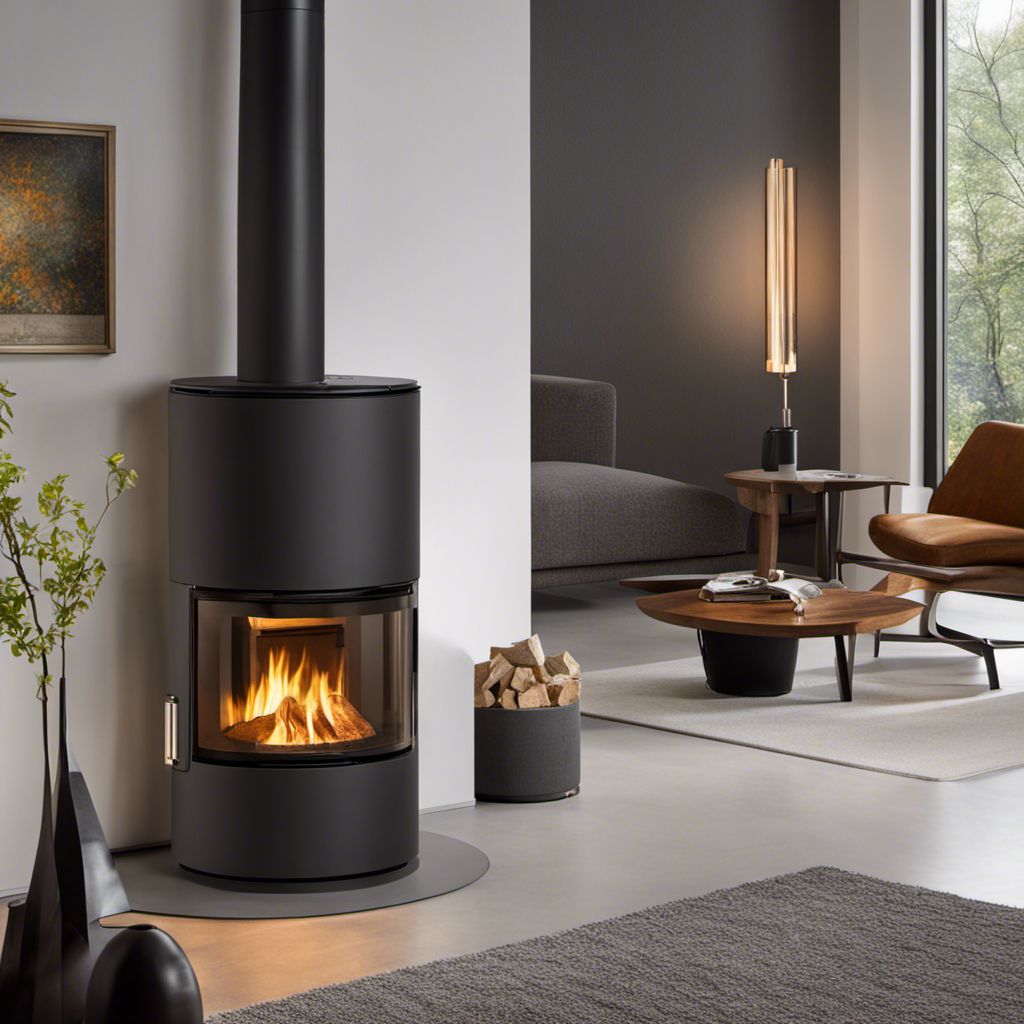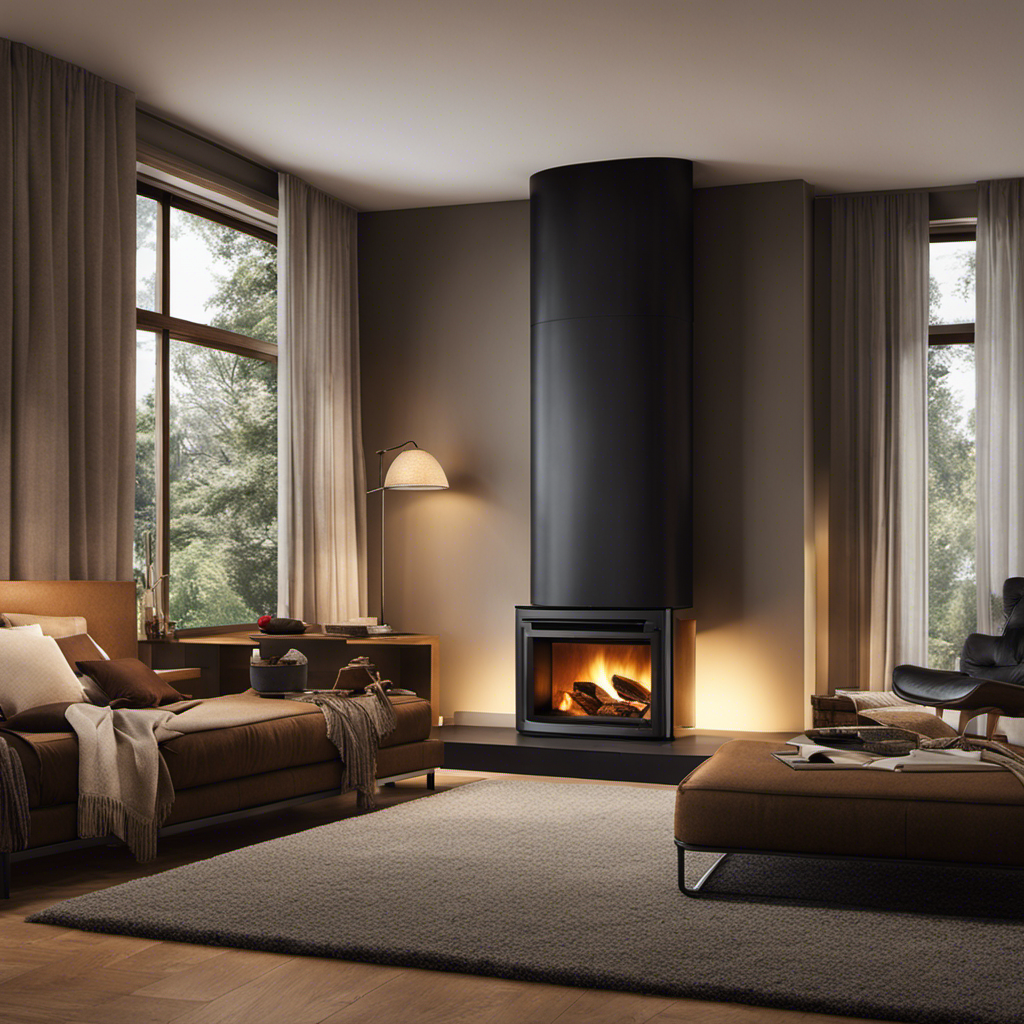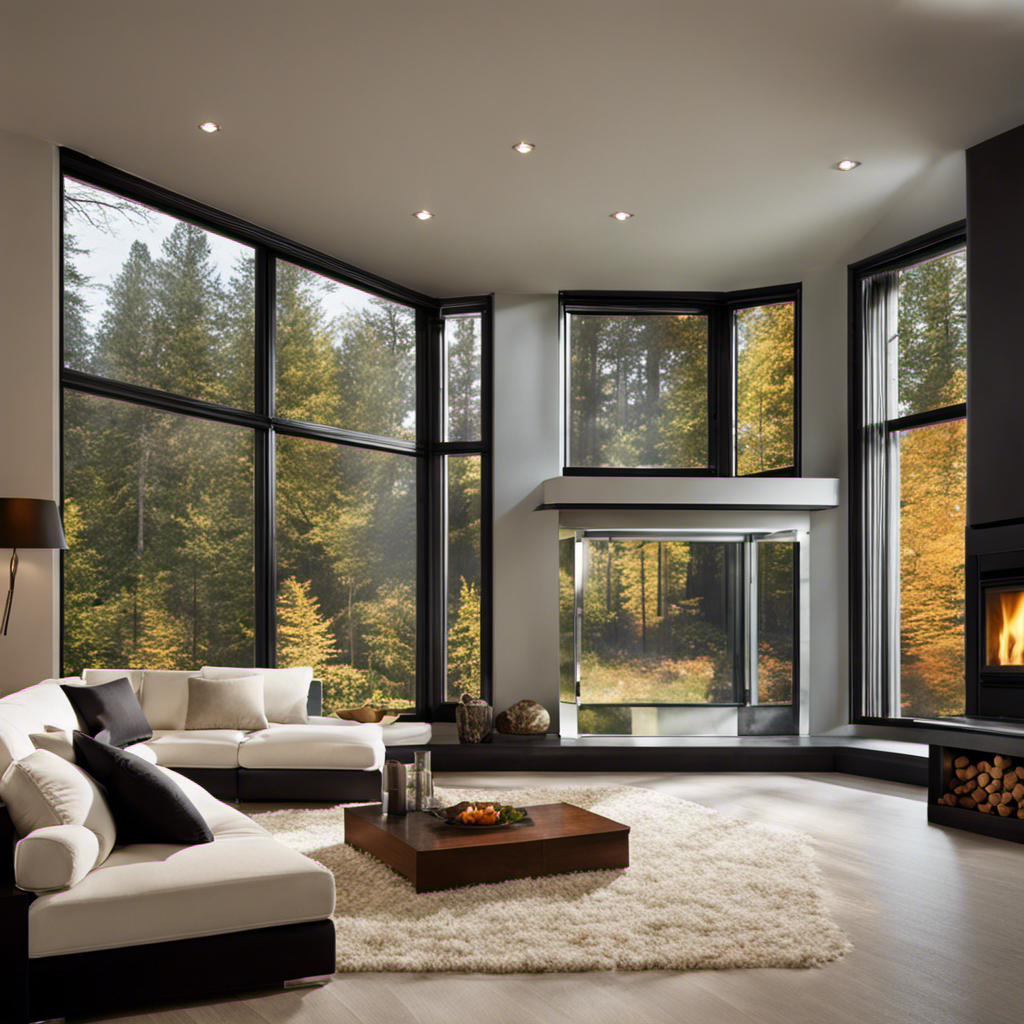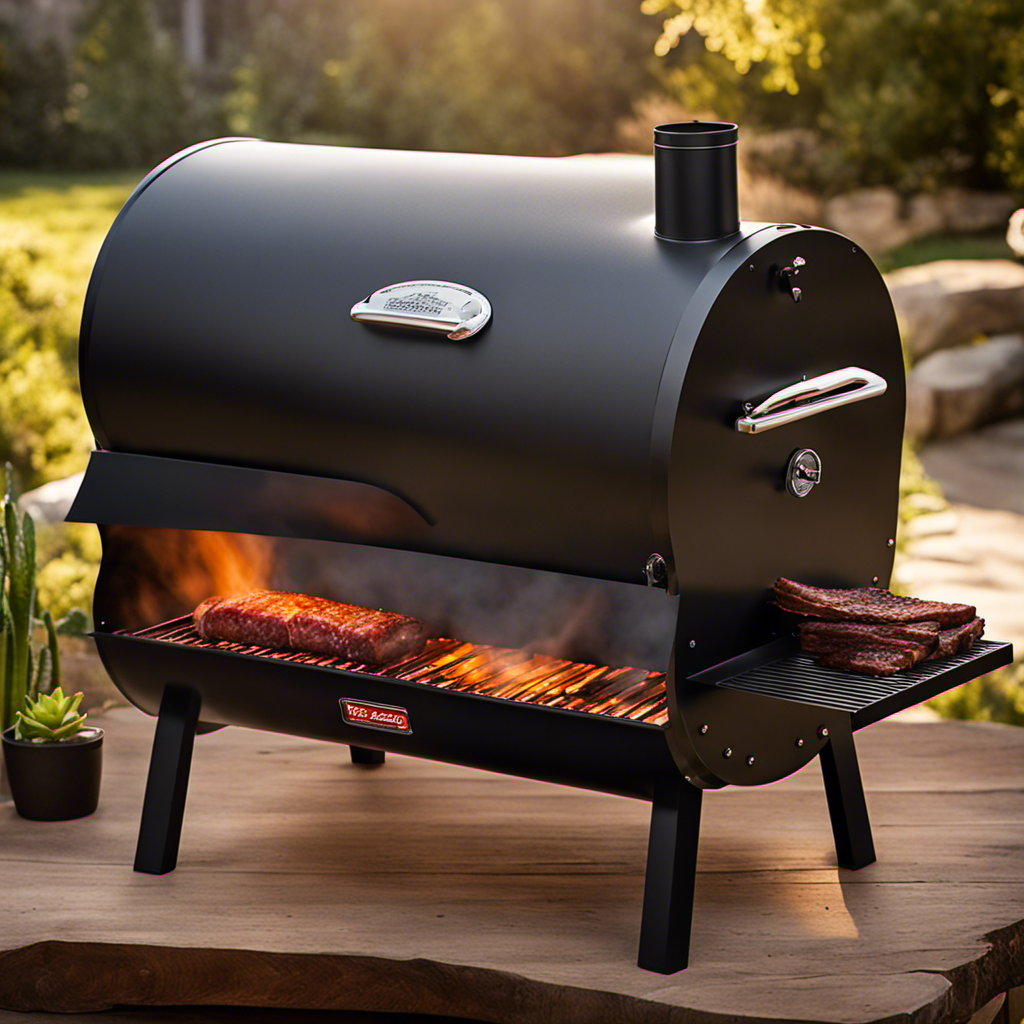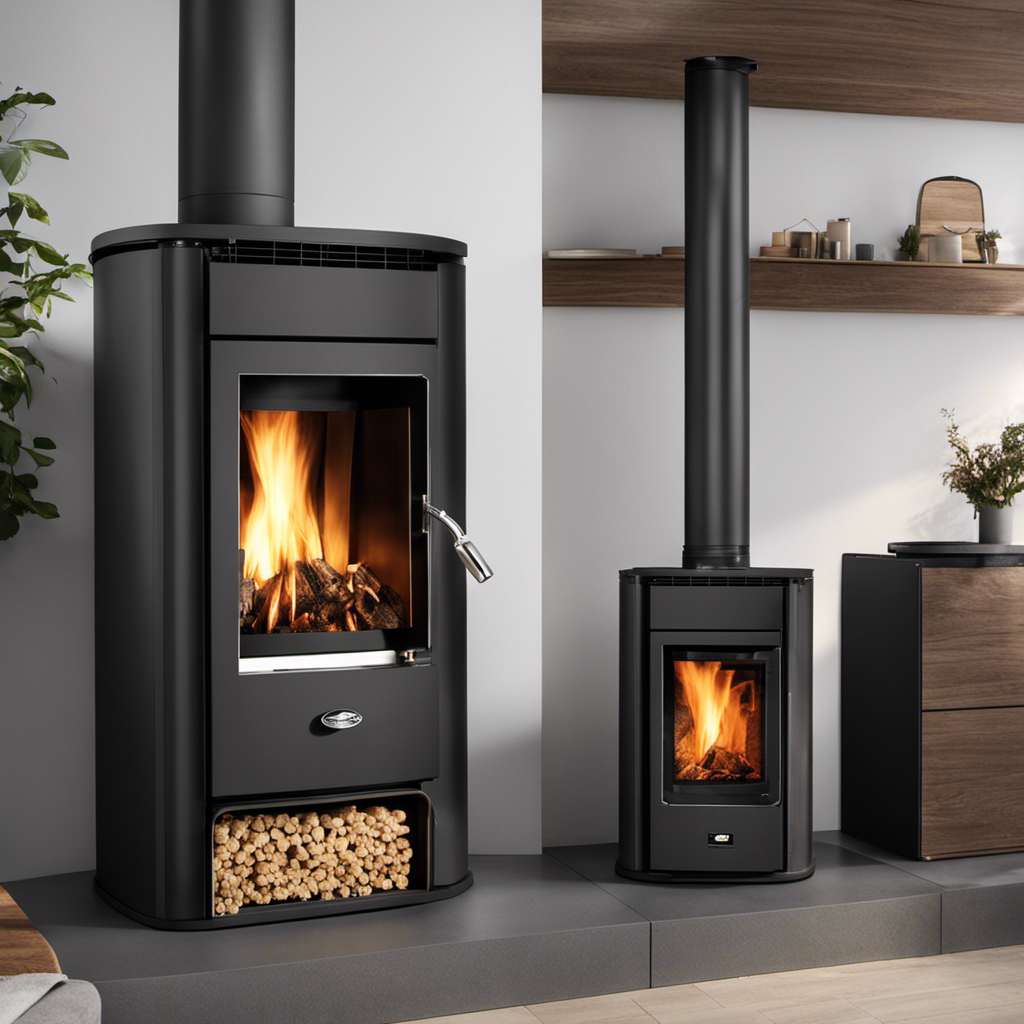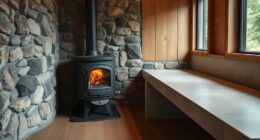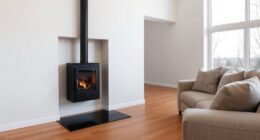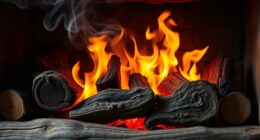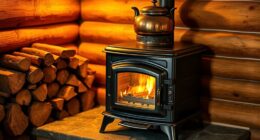We’ve discovered some unexpected facts about how pellet stoves use electricity.
Did you know that wet pellets can cause extended igniter operation and increase energy usage?
But don’t worry, we’ve got practical solutions to reduce electricity consumption.
From using higher quality pellets to upgrading the fan, we’ve got you covered.
Plus, we’ll compare the energy savings of pellet stoves to other heating systems.
Join us as we unveil the surprising truth and discover how you can save energy and money.
Key Takeaways
- Wet pellets, clogged vents, faulty igniters, and old fans can all contribute to increased electricity usage in pellet stoves.
- Using higher quality and drier pellets, upgrading the fan, ensuring proper ventilation, regular cleaning, and following a maintenance schedule can help reduce electricity usage in pellet stoves.
- Pellet stoves are designed for standard electric power supply and can be used with a UPS system during power outages.
- Pellet stoves are highly efficient and cost-effective compared to electric heating systems, but gas heating is the most effective and cheapest option.
Causes of Increased Electricity Usage in Pellet Stoves
One reason we may experience increased electricity usage in pellet stoves is due to wet pellets causing extended igniter operation. When the pellets are wet, the igniter has to work for a longer period of time to ignite them, consuming more electricity in the process.
Additionally, clogged vents play a significant role in increased electricity consumption. When the vents are clogged, the fan has to work harder to push the air through, resulting in higher energy usage. It’s important to ensure that the vents are clean and free of any obstructions to maintain optimal airflow and minimize electricity usage.
Ways to Reduce Electricity Usage in Pellet Stoves
To reduce our electricity consumption in our pellet stove, we can take the following steps:
- Use higher quality and drier pellets for improved ignition efficiency.
- Upgrade the fan to a higher quality one that consumes less power.
- Install the stove in a well-ventilated area for better air circulation.
- Regularly clean the stove to ensure optimal performance.
- Follow a proper maintenance schedule to save both pellets and electricity.
Using high quality pellets ensures that they burn more efficiently, reducing the amount of electricity needed for ignition. Upgrading the fan to a more efficient one not only consumes less power but also helps with better air circulation, improving the overall performance of the stove.
These simple steps can significantly reduce our electricity usage, saving both energy and money in the long run.
Electrical Requirements for Pellet Stoves
When installing our pellet stove, we need to ensure that it’s designed for a standard electric power supply, typically 120V.
In addition to the standard power supply, there are also options available for utilizing solar power for pellet stoves. By incorporating solar panels into the system, we can reduce our reliance on traditional electricity sources and decrease our carbon footprint.
Another option to consider is a battery backup system for pellet stoves. This ensures that even during power outages, our pellet stove will continue to operate, providing us with warmth and comfort. Battery backup systems can be connected to the pellet stove through an inverter, allowing for seamless integration.
Energy Savings of Pellet Stoves Compared to Other Heaters
Compared to other heaters, pellet stoves offer highly efficient and cost-effective heating options, making them a great choice for saving both energy and money.
- Pellet stoves are highly efficient, converting a high percentage of fuel into usable heat.
- They’ve a high combustion efficiency, which means less fuel is wasted.
- Pellet stoves can be programmed to operate at specific times, allowing for better control over energy usage.
- They provide consistent and even heat distribution throughout the room.
In terms of energy savings and efficiency comparison, pellet stoves are a standout choice. They outperform electric heating systems, which can be costly to operate. Gas heating is the most effective and cheapest option, but pellet stoves offer comparable efficiency and savings.
Fan heaters consume a significant amount of electricity, while water heating can provide power savings when combined with a gas system. Overall, pellet stoves offer excellent energy savings and efficiency, making them a smart choice for heating your home.
Importance of Proper Maintenance for Pellet Stoves
Maintaining our pellet stoves through regular cleaning and following a maintenance schedule is crucial to ensure optimal efficiency and prevent increased energy consumption.
The benefits of regular maintenance for pellet stoves are often overlooked, leading to common misconceptions about pellet stove maintenance. Contrary to popular belief, regular cleaning and maintenance not only extend the lifespan of the pellet stove but also save pellets and electricity.
Cleaning the stove regularly and removing ash and debris is crucial, as it prevents unnecessary energy consumption. Moreover, maintaining the auger, igniter, and fan prevents further energy wastage.
Following a maintenance schedule not only saves energy but also ensures that the pellet stove operates at its peak efficiency, providing optimal heat output.
Surprising Truth About Electricity Usage in Pellet Stoves
Regular cleaning and maintenance of our pellet stoves ensures optimal efficiency and prevents unnecessary energy consumption. The impact of wet pellets on electricity usage in pellet stoves can be significant. Wet pellets cause extended igniter operation, leading to increased electricity consumption. Clogged vents also contribute to higher energy usage, as the fan has to work harder to maintain proper airflow.
Faulty igniters and old fans can run longer and consume more power than necessary. The role of proper maintenance in reducing electricity consumption in pellet stoves is crucial. By using higher quality and drier pellets, upgrading fans, ensuring proper ventilation, and following a regular cleaning and maintenance schedule, we can save both pellets and electricity.
Taking care of our pellet stoves not only improves efficiency but also extends their lifespan and prevents premature replacement.
Frequently Asked Questions
Are Pellet Stoves More Energy-Efficient Than Traditional Wood Stoves?
Pellet stoves are more energy-efficient than traditional wood stoves. They provide cost savings and have a lower environmental impact.
Compared to wood stoves, pellet stoves have higher combustion efficiency, resulting in less wasted heat. They also produce fewer emissions, contributing to cleaner air quality.
Additionally, pellet stoves can be automated and have thermostatic controls, allowing for better temperature management and energy conservation.
Overall, pellet stoves are a more efficient and sustainable heating option.
Can Pellet Stoves Be Used as a Primary Source of Heating for an Entire Home?
Yes, pellet stoves can be used as a primary source of heating for an entire home. They’re highly efficient, cost-effective, and comparable to wood stoves in terms of energy savings.
However, there are pros and cons to consider. Pellet stoves require electricity to operate, which can lead to increased electricity usage. Additionally, the cost of pellets may vary depending on location.
Overall, pellet stoves offer a viable option for home heating, but it’s important to consider the specific needs and circumstances of your home.
Is It Possible to Retrofit an Existing Wood Stove to a Pellet Stove?
Retrofitting an existing wood stove to a pellet stove is feasible, but it requires careful consideration. Factors such as the condition of the wood stove, available space, and compatibility with pellet stove components need to be assessed.
The cost comparison between retrofitting and purchasing a new pellet stove should also be taken into account. It’s recommended to consult with a professional to determine the best course of action for your specific situation.
How Often Should a Pellet Stove Be Cleaned and Maintained?
Cleaning frequency and maintenance requirements for pellet stoves depend on various factors including usage and environmental conditions.
Regular cleaning is essential to ensure optimal efficiency and prevent increased electricity usage. It’s recommended to clean the stove at least once a month, removing ash and debris.
Maintenance requirements include checking and maintaining the auger, igniter, and fan to prevent unnecessary energy consumption.
Following a proper maintenance schedule saves pellets and electricity, and extends the stove’s lifespan.
Are There Any Government Incentives or Rebates Available for Purchasing and Using Pellet Stoves?
There are government incentives available for purchasing and using pellet stoves, which can help offset the cost and promote energy-efficient heating. These incentives aim to encourage the use of pellet stoves as a more sustainable and eco-friendly heating option.
Additionally, pellet stoves are known for their efficiency, as they provide cost-effective heating compared to electric systems. By taking advantage of these incentives and considering the efficiency of pellet stoves, homeowners can save both money and energy.
Conclusion
In conclusion, by addressing the causes of high electricity consumption in pellet stoves and implementing effective solutions such as using high-quality pellets and upgrading fans, we can significantly reduce energy usage.
Not only are pellet stoves more efficient and cost-effective compared to other heating systems, but they also offer the added benefit of reducing environmental impact.
With proper maintenance, pellet stoves can provide both energy savings and a cozy, sustainable heating solution.

